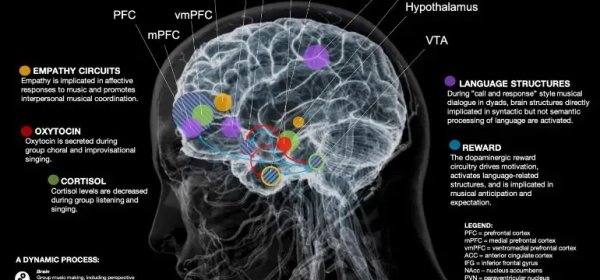A team of social neuroscientists from Bar-Ilan University and the University of Chicago developed a model of the brain that focuses on what happens when


A team of social neuroscientists from Bar-Ilan University and the University of Chicago developed a model of the brain that focuses on what happens when

This research on why beat synchronisation and language processing and reading skills are connected can only strengthen music education teaching and advocacy.

Researchers in Germany have found that a rhythm-based music programme helped pre-school children control one of their executive functions: their impulsive responses.

In this new podcast, Anita Holford, co-editor of Music Education Works, is talking with Liv McLennan, who is a community musician and a specialist in early years music.

The recently launched ‘Sounds of Intent in the Early Years’ research report provides powerful evidence that every child should have the right to access music.

A new podcast by Anita Holford, co-editor of Music Education Works, features Australian music educator and researcher, Dr Anita Collins. You may know Anita from her TED Ed lesson, How playing an instrument benefits your brain, and her TEDx talk, What if every child had access to music education from birth? And more recently, she’s starred in the Australian version of a British TV show, ‘Don’t Stop the Music’.

Researchers from Massachusetts Institute of Technology and Beijing Normal University have found that piano lessons help improve children’s language skills.

Early childhood music training can lead to improvements in both musical skills and language skills, according to Dr Sean Hutchins at the Royal Conservatory of

The ability to synchronise with a beat could indicate how well children of pre-school age will develop their future reading skills.

A recent paper by Professor Susan Hallam from the UCL Institute of Education, concludes that making music has a major impact on the development of language skills among children and young people.

Dr Anita Collins explores the latest science behind lullabies in this interview on Radio Melbourne in June 2017.

According to a recent research report, Sistema Scotland’s social change programme in Aberdeen – Big Noise Torry – has enhanced participants’ ability to learn in school, improved academic and behavioural skills, boosted school attendance rates, and improved their emotional wellbeing.